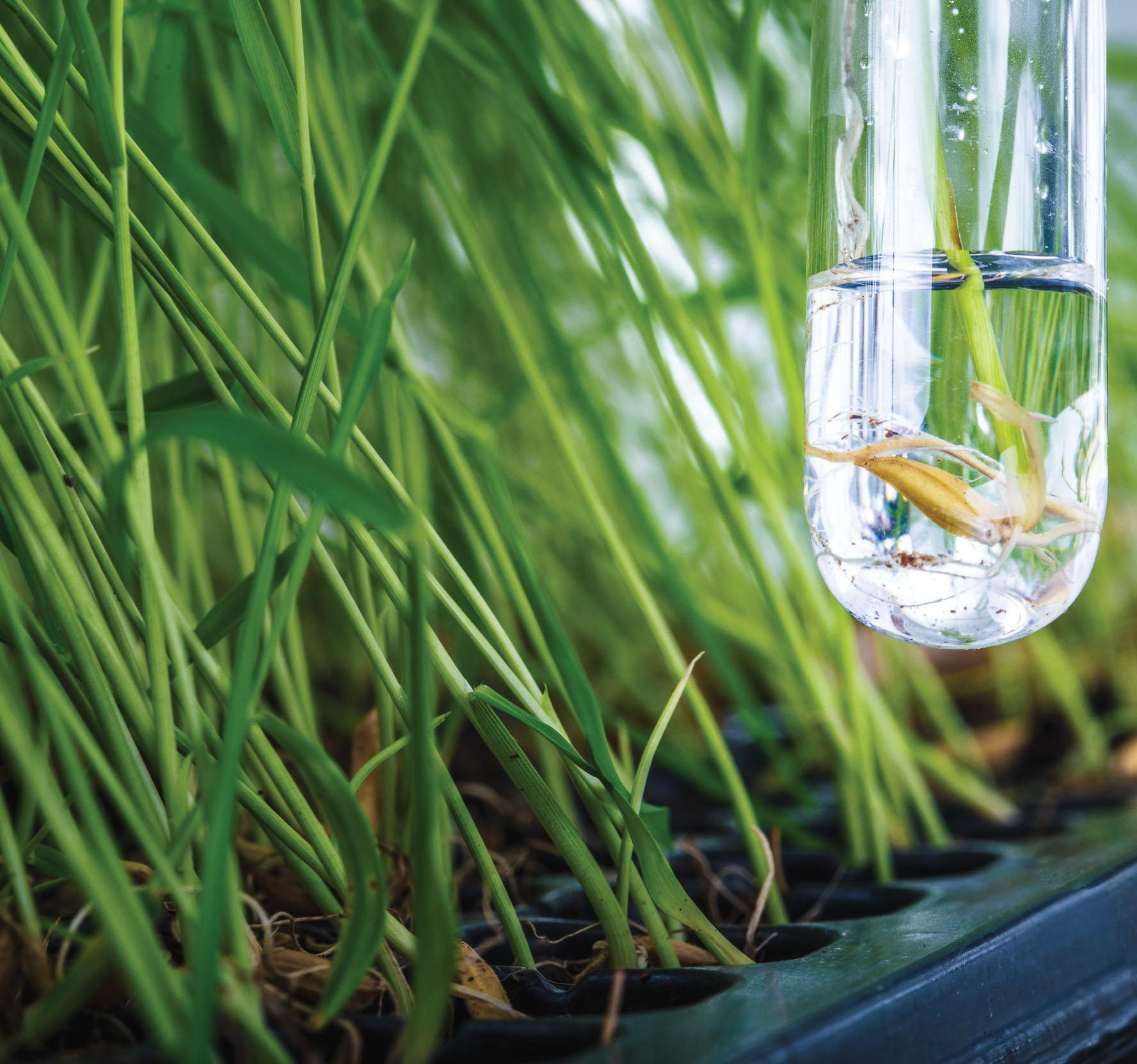India's Efforts towards Building Climate Resilience in Agriculture through Genome Editing
Extraordinary and Plenipotentiary Diplomatist
|July 2025
India is playing an increasingly important role in global discussions on climate action and sustainability, including at the recent G7 Summit held in Canada on June 16-17, 2025.

Building resilience in agriculture has been identified as one of the six thematic areas under India's recently launched BIOE3 policy, which emphasises biotechnology-driven solutions for environmental sustainability, economic growth, and enhanced resilience. This article underscores the pivotal role of genome editing technologies in developing climate-resilient crop varieties, offering sustainable solutions to the challenges posed by climate change.
Agriculture forms the backbone of India's economy, providing livelihoods to nearly half of its population and contributing significantly to GDP, food security, and rural employment. Despite achieving self-sufficiency in food grain production, Indian agriculture remains highly vulnerable to the growing threats posed by climate change. The increasing frequency of heatwaves, floods, droughts, and unpredictable weather patterns has amplified risks to both productivity and income stability, particularly for small and marginal farmers.
As Indian agriculture remains predominantly smallholder-driven and heavily dependent on the monsoon, it is particularly vulnerable to climate variability. This necessitates the need for innovative solutions like genome editing to develop climate-resilient, high-yielding, and resource-use-efficient crop varieties.
Over the past decades, India has taken significant steps toward building climate-resilient agriculture. The launch of the National Innovations on Climate Resilient Agriculture (NICRA) by the Indian Council of Agricultural Research (ICAR) in 2011 was a milestone in this direction. Under NICRA, several stress-tolerant varieties resilient to drought, floods, pests, and diseases of rice, maize, mung bean, tomato, and lentil were developed through conventional methods of breeding. These initiatives have helped farmers mitigate some risks associated with climate change.
Denne historien er fra July 2025-utgaven av Extraordinary and Plenipotentiary Diplomatist.
Abonner på Magzter GOLD for å få tilgang til tusenvis av kuraterte premiumhistorier og over 9000 magasiner og aviser.
Allerede abonnent? Logg på
FLERE HISTORIER FRA Extraordinary and Plenipotentiary Diplomatist

Extraordinary and Plenipotentiary Diplomatist
Kenya Tourism, Trade, Culture and Cuisine
Relations between Kenya and India date back several centuries, founded on historical maritime trade across the Indian Ocean and reinforced through shared experiences during the colonial and post-independence eras.
5 mins
November 2025

Extraordinary and Plenipotentiary Diplomatist
Taste, Travel & the Indian Experience: Reclaiming the Diplomacy of the Senses
\"Our similarities are way more than our differences. And our differences are just there to keep things interesting.\"
5 mins
November 2025

Extraordinary and Plenipotentiary Diplomatist
Chile A Land of Poetry, Peace, and the Living Arts
Stretching gracefully between the Pacific Ocean and the mighty Andes mountain range, Chile is a nation that seems to hold the world's extremes: the driest desert in the north, glaciers in the south, and fertile valleys and vineyards in between. Yet beyond its natural wonders lies another richness: a deep and enduring love for art, poetry, and beauty.
3 mins
November 2025
Extraordinary and Plenipotentiary Diplomatist
"Visit Malaysia 2026 – Surreal Experience: where every moment feels like coming home”
In this exclusive conversation with Diplomatist Magazine, Mr. Ahmad Johanif Mohd Ali, Director of Tourism Malaysia, reflects on Malaysia's evolving tourism vision. He shares how Malaysia is shifting from destination-based promotion to immersive, people-centred storytelling that speaks to today's Indian traveller. He highlights the growing potential of niche segments such as destination weddings and golf tourism, the impact of visa-free entry, and the importance of strengthening air connectivity and regional partnerships within ASEAN. Emphasising responsible tourism, community engagement, and cultural exchange, Mr. Johanif positions Malaysia not just as a place to visit, but as a heartfelt experience rooted in warmth, belonging, and shared heritage.
6 mins
November 2025

Extraordinary and Plenipotentiary Diplomatist
The Light That Endures
Artist: Samia Israt Ronee - Across these five works — “Ode to Freedom,” “The Spring Bough,” “Conversation,” “Padma, Unbound,” and “The House of Tango” — the artist explores the quiet dialogues between nature, memory, and emotion.
2 mins
November 2025

Extraordinary and Plenipotentiary Diplomatist
Diaspora Diplomacy - A View from Gujarat
I joined the British Diplomatic Service 23 years ago. Many things have changed in that time. But one thing has remained constant: the diplomat's penchant for sloganeering and jumping on the latest bandwagon.
3 mins
November 2025

Extraordinary and Plenipotentiary Diplomatist
Tractors, Technology, and Transformation
In a candid conversation with Diplomatist Magazine, Mr. Rajiv Wahi, CEO of International Business, Captain Agri Machinery Exim LLP, articulates his ambitious blueprint for repositioning India's agri-machinery sector on the global stage. Charting his trajectory from automobiles and construction equipment to smallholder-centric agricultural mechanisation, Mr. Wahi unpacks the untapped potential of the compact tractor segment, the intricate hurdles of penetrating emerging markets, and the indispensable value of strategic partnerships and ecosystem innovation. With a lens on ingenuity, localisation, and the evolving contours of international agricultural engagement, he presents a visionary roadmap for 2035: elevating India to a leadership role in sub-50 HP tractors, exporting not merely equipment but empowerment, resilience, and sustainable impact.
4 mins
November 2025

Extraordinary and Plenipotentiary Diplomatist
Reimagining Europe's Global Role: A Conversation with Prof. Nathalie Tocci
In an informative exchange with Diplomatist, Professor Nathalie Tocci, Director of the Istituto Affari Internazionali and Professor of Practice at Johns Hopkins University SAIS Europe, reflects on Europe's evolving strategic identity in a world marked by shifting power equations and the growing resonance of the Global South. From the EU's pursuit of strategic autonomy and climate diplomacy to the urgent need for reforming multilateral institutions, Tocci offers a sharp, forward-looking perspective on how Europe must redefine its global role—balancing principles with pragmatism. She also shares her insights on the emerging contours of India—EU cooperation, the rise of multipolarity, and the role of think-tanks in navigating disruption and disinformation.
4 mins
November 2025

Extraordinary and Plenipotentiary Diplomatist
YOUTH-LED DIPLOMACY - The Rise of Young Voices in India's Multilateral Engagement
Twenty-first-century diplomacy is witnessing a quiet revolution that marks a decisive shift in global governance. For India, which has set its sights on becoming a “Vishwaguru by 2047”, the empowerment of its massive youth demographic is a diplomatic imperative apart from the social goal.
4 mins
November 2025

Extraordinary and Plenipotentiary Diplomatist
The Timeless Charm of Romania
Romania is not a postcard from the past but a country perpetually in dialogue with its own history where myth informs modernity, and where every festival, song, and stitch still hums with the timeless refrain of belonging.
3 mins
November 2025
Listen
Translate
Change font size

